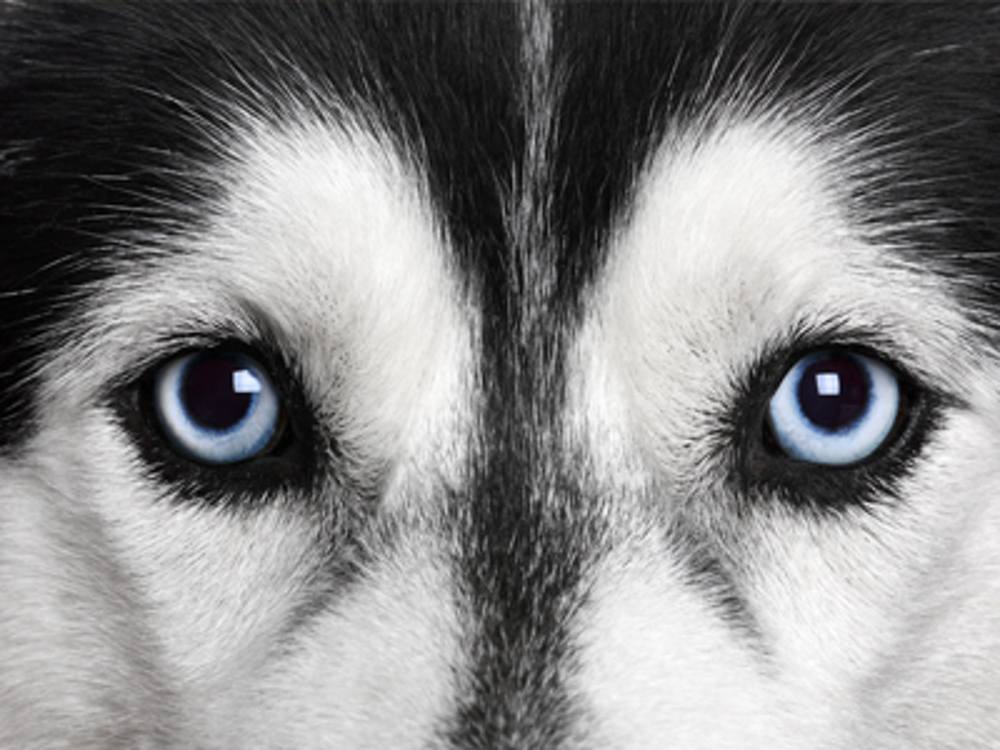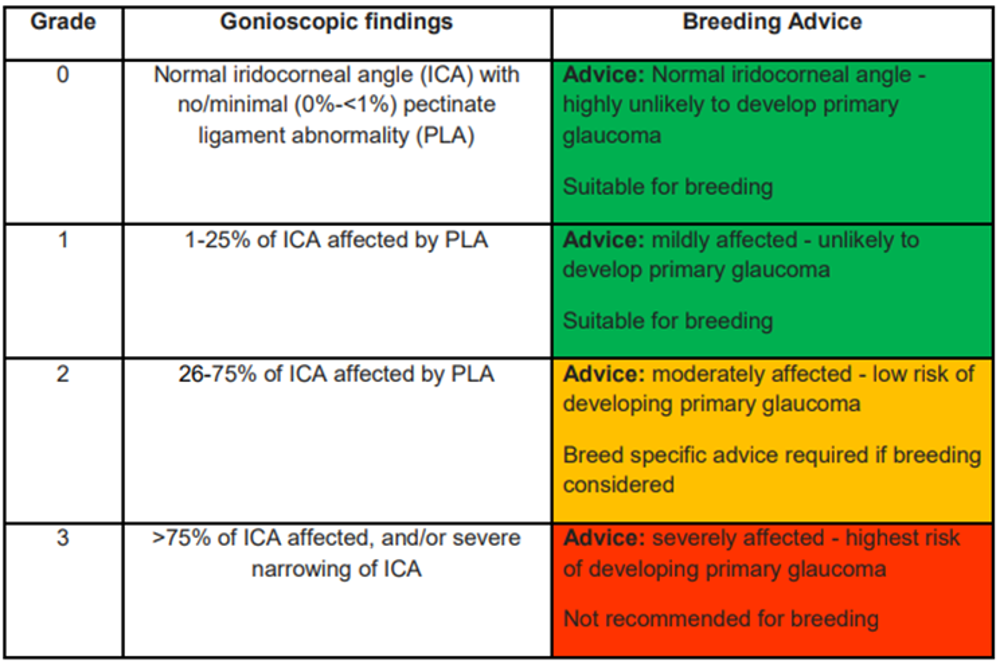
What is gonioscopy?
Gonioscopy is a type of eye exam that looks for signs that a dog is affected by a painful and blinding disease known as primary glaucoma. How much the eye is affected is recorded and given as a grade. This grade can be used to help make health focused breeding decisions that reduce the risk of producing puppies that grow up to be affected by primary glaucoma.
What is primary glaucoma?
Primary glaucoma is an inherited condition caused by a build-up of pressure in the eye. This increased pressure occurs because the eye is not able to properly drain away enough of the fluid made inside.
Primary glaucoma can be divided into two types:
- Primary open angle glaucoma (POAG)
- Primary angle closure/ closed angle glaucoma (PCAG).
The information below relates to gonioscopy for primary angle closure/ closed angle glaucoma only.
What are the clinical effects of primary glaucoma?
Clinical signs of the primary angle closure/ closed angle glaucoma are:
- depression
- signs of eye pain, such as excessive blinking and avoiding bright light
- cloudiness at the front of the eye
- a reddened eye
- a dilated non-responsive pupil
- blindness
What causes primary glaucoma?
Primary glaucoma is caused by a build-up of pressure that occurs because some of the fluids that are produced in the eye can’t drain away properly.
Primary angle closure/ closed angle glaucoma is linked to a problem with the drainage angle. This is the angle between the iris (the coloured part of the eye) and the cornea (the clear window part of the eye). This issue with the angle is termed pectinate ligament abnormality (PLA), but is also known as goniodysgenesis (gonio = angle, dysgenesis = defective development).
How is glaucoma inherited?
How primary angle closure/ closed angle glaucoma is inherited is not fully understood, but researchers believe that it may be controlled by a number of different genes and also influenced by some factors that a dog may be exposed to during its life.
The way in which these sorts of conditions are inherited is not straight forward, and so they are called complex inherited disorders.
Is this test relevant to my breed?
Find out which health tests or schemes are recommended for your breed on our Breeds A to Z. These recommendations are suggested by breed clubs and approved by The Kennel Club's committees.
How do I get my dog graded?
Gonioscopy requires a degree of expertise and specialised equipment and so these examinations are not usually a routine part of the eye scheme. Gonioscopy may not be available from every member of the BVA/KC/ISDS Eye Panel.
Book a test
You will need to book your test through a BVA/KC/ISDS eye panellists. A list of eye panellists is available from the British Veterinary Association. When telephoning a panellist to book an appointment make sure you check that they can carry out gonioscopy.
What happens at a grading?
The eye panellist will apply some local anaesthetic drops to your dog’s eye. A type of examination lens, known as a goniolens, is put on the surface of your dog’s eye so that the drainage angle can be looked at. This test will be done on both eyes.
Some dogs may need to be sedated. The fee for sedation may be in addition to the cost of the test. Your eye panellist will give you advice on whether this is required.
What you need to bring with you
Owners of dogs registered with The Kennel Club must have the relevant documents with them at the time of a gonioscopy test.
Who gets a copy of the results?
The panellist will examine the dog, issue a certificate and inform the owner of the result at the time of examination. Copies of the certificate are distributed to the owner, the owner’s veterinary surgeon, the BVA and the examining eye panellist.
More about the scheme
For further information on the scheme, please visit the BVA website.
Costs
Goniscopy test costs
|
|
COST (EX. VAT) PER DOG |
COST (INC. VAT) PER DOG |
|---|---|---|
|
Gonioscopy per dog - separate examination |
£50 |
£60 |
|
Gonioscopy performed at same time as a routine examination |
£45 |
£54 |
|
Repeat gonioscopy (presenting previous certificate) 10% off current price |
|
|
|
Separate examination |
£45 |
£54 |
|
Performed as same time as routine |
£39.17 |
£47 |
|
POAG |
£50 |
£60 |
At what age can my dog have a gonioscopy test?
Gonioscopy can be performed in dogs from 6 months of age onwards. In some breeds the grade has been shown to change with time. We therefore advise that gonioscopy is performed at approximately 1, 4 and 7-8 years of age.
What gonioscopy results can a dog have?
Dogs are either classified as:
- Grade 0 (unaffected – normal angle)
- Grade 1 (mildly affected)
- Grade 2 (moderately affected)
- Grade 3 (severely affected)
Breeding advice
In general, we recommended that you should not breed from dogs affected by known inherited eye conditions, but it is accepted that other factors such as the prevalence of the condition in the breed and the breed’s genetic diversity may also come into play.
It is preferable to only breed with dogs with grade 0 or grade 1 in most breeds.
Dogs scored grade 2 (moderately affected) have a greater risk of developing and passing on the condition to offspring, in comparison to breeding dogs with grades 0 and 1.
In breeds that have significant concerns relating to maintenance of genetic diversity, we advise that only grade 2 dogs in excellent health, and with good results from other screening schemes, may be used cautiously for breeding with particular care to use mates with the best possible gonioscopy results (preferably grade 0). This advice may change, however, as further research is performed.

Find a dog's gonioscopy score
Our Health Test Results Finder can help you find a dog's gonioscopy score, or results from any DNA tests and health screening schemes that we record. This tool can help you make informed decisions, whether you're a breeder trying to find a suitable healthy mate for your dog, or a puppy buyer wanting to know more about the health of a puppy's parents.
Questions and answers
How can I lodge an appeal?
There is a set procedure for appealing against the results of an eye examination should you wish to do so and the panellist will supply the requisite leaflet. Appeals must be lodged in writing with the BVA within 30 days of the examination.
Find out how to contact the BVA for more information on the appeals process.
